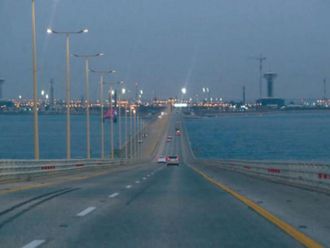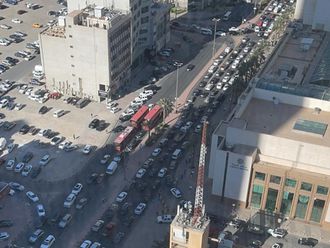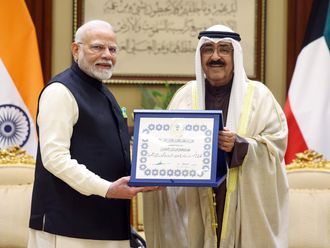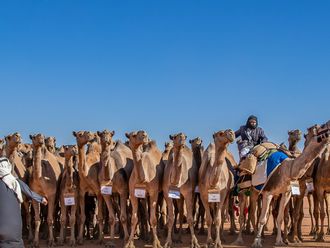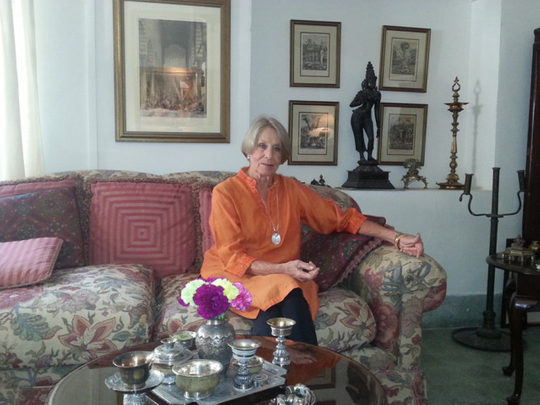
Manama: Stunning faces, amazing tales, adventures on dhows, desert journeys, athletic prowess, and trip exploits: the details of Pat Boyer’s life in Bahrain have the makings of an astonishing thrill-filled biographical movie.
But for the American teacher, who arrived in Bahrain 37 years ago on an assignment that was expected to last only a few short months, getting her bags ready to leave the country now is certainly the anti-climax of the movie and one of the lowest points in her life.
For the last couple of months, she kept telling herself that she should be ready to move on with her life after more than decades and a half in the country that she eventually called ‘a home away from home’.
She tried to conjure up pictures of the family home in rural Pennsylvania in the beautiful East of the US. “It would be great to go back to my roots,” she said to herself.
Yet, she did not sound convincing even to herself.
The party that her colleagues from Bahrain School and friends and the messages she received reassured her about the meaning of friendship and compassion, but also reminded how of how much she will be missing after she leaves.
The thousands of deeply engraved memories of friends, colleagues and students, and an outstandingly active involvement in the education of several generations of bright young men and women and the idea of moving away from it all was frustratingly painful.
A goodbye kiss invariably tastes harsh when laced with bitterness.
It was given to a very few foreigners to travel by dhows to Saudi Arabia, to purchase sweet water delivered on donkey carts to homes and to witness the excavations of the Dilmun era. These are particularly rosy memories that she will always recall with tender fondness.
Pat arrived in Bahrain on September 19, 1976 from Italy to teach at the Bahrain School, one of the rare educational institutions that accommodated foreign communities at the time.
She joined as a dormitory counsellor at the school.
“Thirty-seven years ago it was an adventure for teachers and students,” she recalled. “I joined work as dormitory counsellor and after three years, I taught physical education to all grades. It was rough as it was not a fancy place and it was definitely an adventure to study there. Yet, it was fun caring and teaching at the school which along with St. Christopher in Awali and Al Raja School in the capital Manama were the pioneers in education at that time.”
She readily shared her memories of her life in the beginning of her stay when sweet water was delivered to her house near the American Mission Hospital where she had lived for 35 years on donkey carts.
“We used to wash vegetables with Milton tablets and take malaria pills. We travelled to Saudi Arabia in dhows [near what is now the Bahrain Financial Harbour] and organised theme house parties as there were no coffee shops or hotels during that time.”
In her recollection, Pat volunteered a testimony about the changes in the country.
“Things have changed over the years from the coastline to skyline, traffic, malls, even branded clothes, which was something that was not present when I arrived in Bahrain,” she said. “But what has not changed is the friendly and hospitable older Bahrainis who had a good sense of humour and accepted people from all walks of life.”
What made her stay so long in Bahrain?
Pat said that she initially thought her Bahrain posting would be for a few months.
“People come and go, but it is the culture that one chooses to adapt here and feels at home. Here you feel part of the country which you cannot experience in Italy, Germany, France where you will always be a foreigner… You feel more involved and attached here,” she said.
“I am lucky and fortunate to live in Bahrain for 37 years,” she said.
She has taught several members of the royal family, including Crown Prince Salman Bin Hamad Al Khalifa.
“He was always polite and he was a good student,” she commented on her former student.
Bahrain was also the centre of her worldwide travel.
“Travel has helped me learn new cultures and collect artistic things.”
Her traditional house in Manama is a cultural cocktail of paintings, memorabilia, statues and other antique items she brought from her trips.
“I have collected these artistic things during my travel and each has a story. There is a charm and tranquillity in these old houses that are traded now for cinder block apartments. These traditional old houses need to be renovated rather than being demolished as it is important to preserve the culture.”
For Pat, the love story with Bahrain is not and cannot be over.
“I will be back on an extended visit to Bahrain,” she said. “Bahrain always brings you back.”


